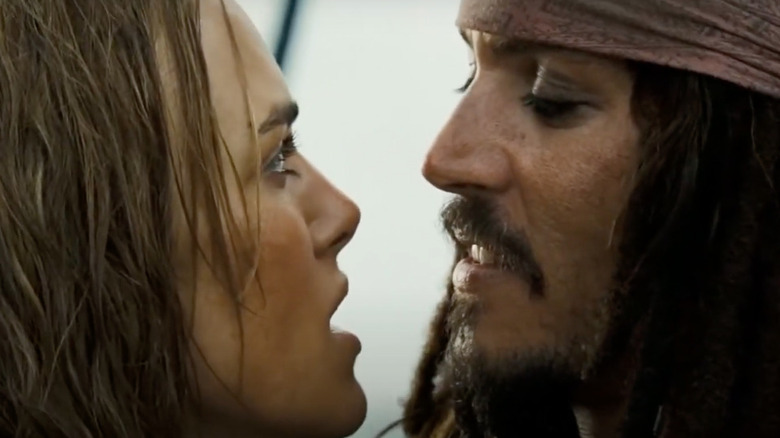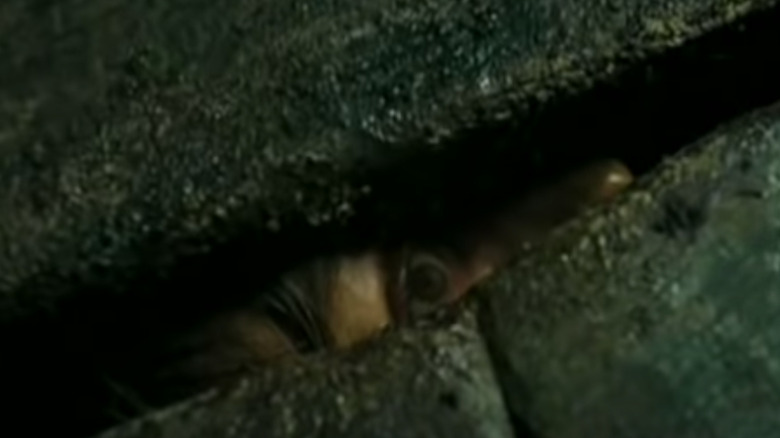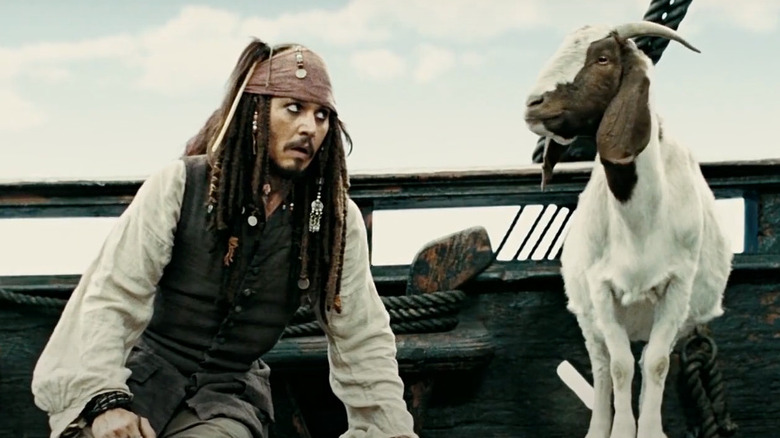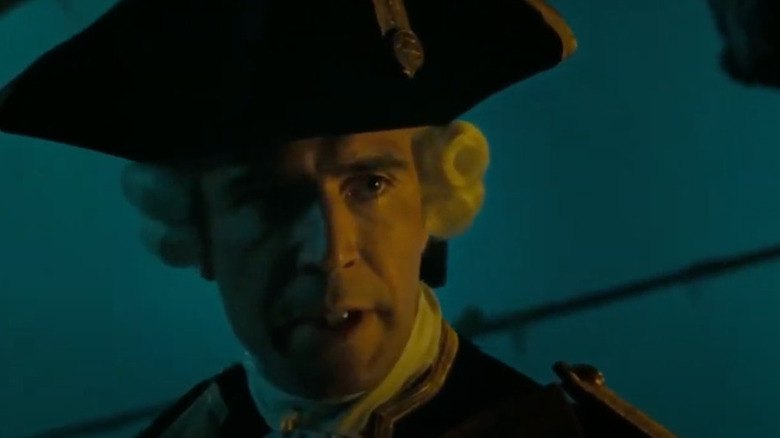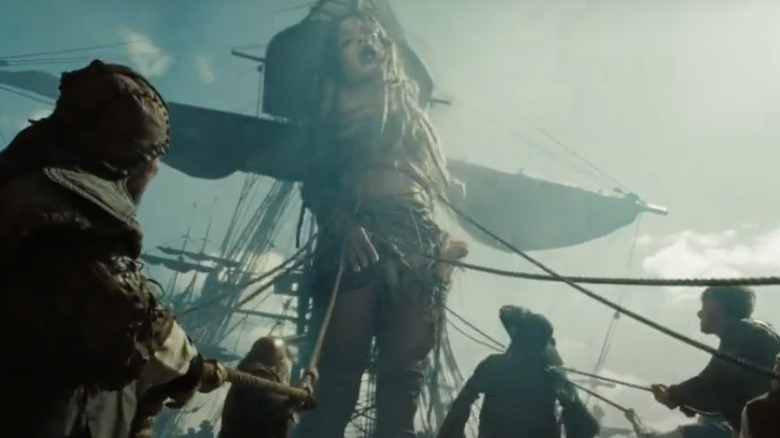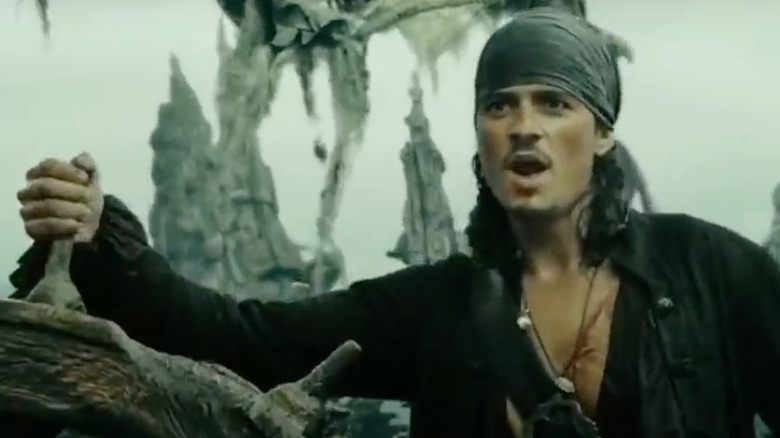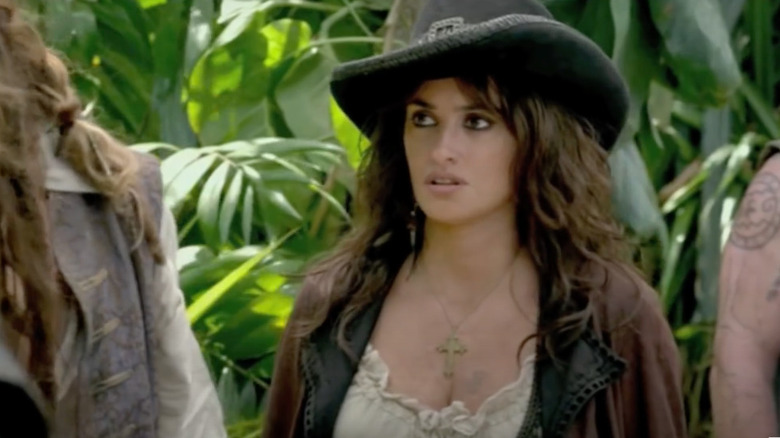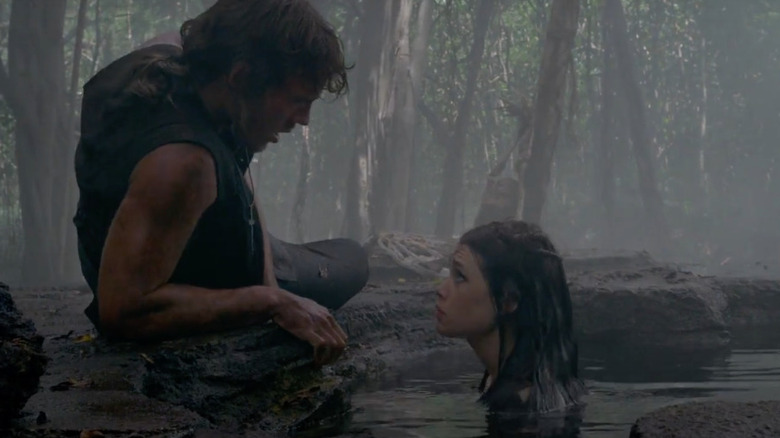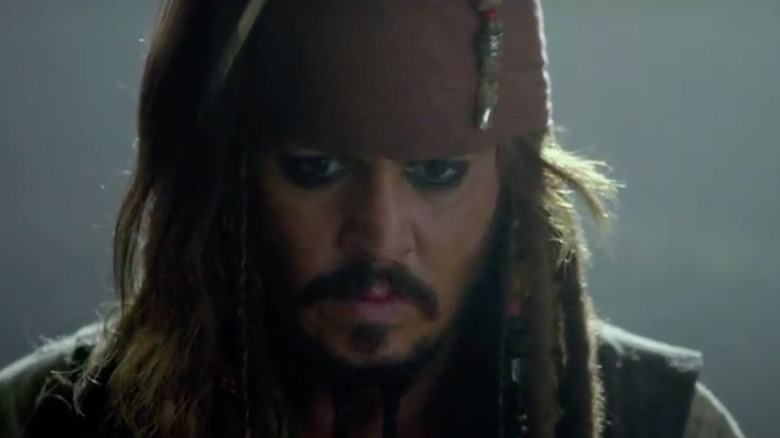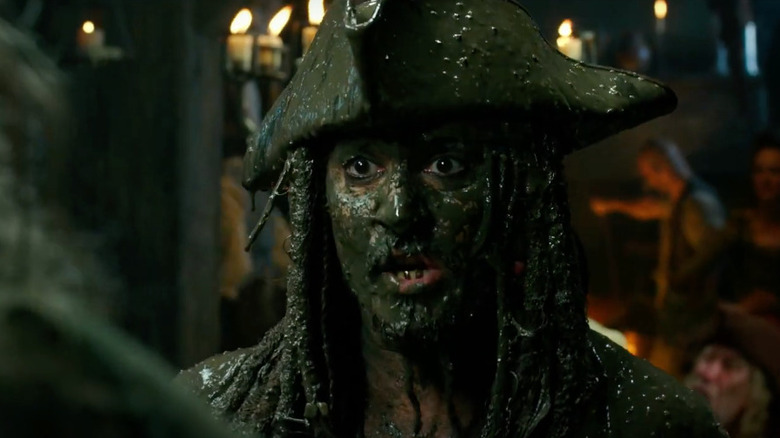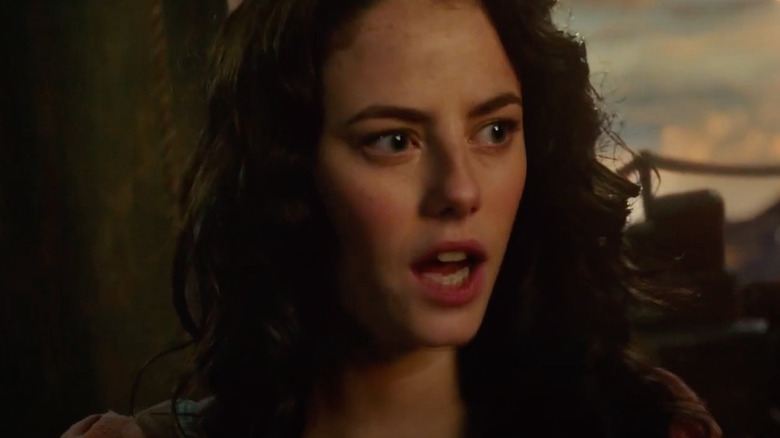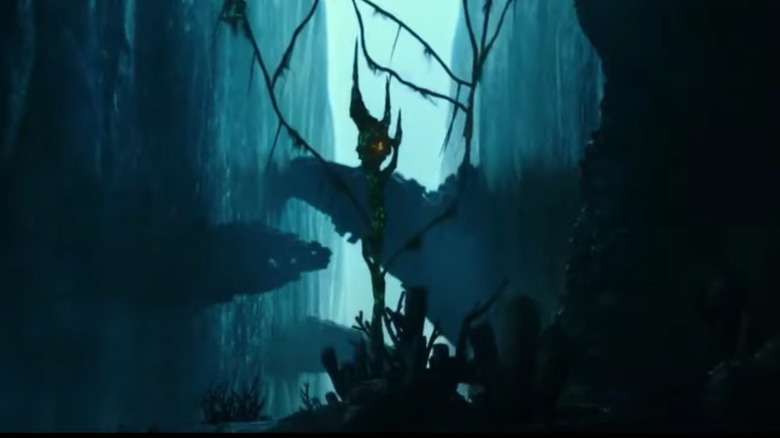Times The Pirates Of The Caribbean Franchise Went Too Far
The "Pirates of the Caribbean" franchise rose to prominence with a clever mix of adventure, humor and heart. Boasting fun characters like the wily Jack Sparrow (Johnny Depp), noble Will Turner (Orlando Bloom), feisty Elizabeth Swann (Keira Knightley) and the cunning Hector Barbosa (Geoffrey Rush), the films delighted audiences for over a decade, accruing some $4.5 billion at the worldwide box office, earning awards (including a few Oscars) and even helping reconfigure the Disneyland ride on which it was based.
They say all good things must come to an end, and "Pirates" was no exception. By the time the fifth and final entry, 2017's "Dead Men Tell No Tales," audiences clearly had their fill of Jack and Co., prompting Disney to put the franchise on ice. One of the main issues with the series that ultimately led to its demise was a lack of fresh ideas, an overreliance on outlandish character beats, and contrived plot points and action scenes that pushed credibility to its absolute limit. What once felt fresh had instead come to resemble desperation.
Which "Pirates" moments went too far, ye might be askin'? Read on matey to hear the tale of times the "Pirates" franchise went too far for its own good.
Elizabeth leaves Jack to the Kraken
The original "Pirates" trilogy made for a relatively smooth ride through the first two films, "Curse of the Black Pearl" and "Dead Man's Chest," but began to hit some bumps at the tail end of part two. In a bizarre character twist, Elizabeth suddenly decided to bind Jack to the Black Pearl, in order to distract the monstrous Kraken long enough for her and the others to escape.
Previously, it had been established that Davy Jones (Bill Nighy) had ordered the Kraken to hunt down and kill Jack, leading to an all out battle during the climax between the tentacled beast and the series heroes. While Will and Elizabeth manage to wound the creature long enough for the survivors (read: the principle cast) to abandon ship, Ms. Swann elects to pursue a plan guaranteed to give her friends a sure-fire escape: she lures Jack with a kiss and then handcuffs him to the ship while he's distracted. "It's after you," she says. "I'm not sorry."
Considering Elizabeth had never previously displayed this selfish, cowardly side to her personality, the move felt out of character. The writers likely wanted an "Empire Strikes Back"-styled twist to keep audiences talking during the year-long wait between parts two and three and decided to go about accomplishing this task with an about-face moment, but all it really did was sully an otherwise solid film.
Ragetti and Pintel look up Elizabeth's robe
During the opening act of "At World's End," Captain Barbosa and his crew venture into the lair of pirate lord Sao Feng (Chow Yun-fat) in search of a map that will lead them to Davy Jones' Locker so they can rescue Jack Sparrow. The heroes form into two groups, with the principle leads entering the villain's fortress via the front door while the supporting characters, namely Gibbs (Kevin McNally), Ragetti (Mackenzie Crook), Pintel (Lee Arenberg) and that guy with the parrot journey through an underground passage.
At one point, Elizabeth, who walks alongside the principle crew, is ordered by one of Sao Feng's guards to remove all of her weapons. We get a funny bit where the young woman unloads an absurd amount of artillery, including a massive blunderbuss. Then, for whatever reason, the guard also instructs her to remove her clothes. Moments later, we see Elizabeth adorned in a robe with nothing underneath but her birthday suit. To make matters worse, as she settles into Sao Feng's throne room, she unknowingly stands directly over Ragetti and Pintel, who peer up through the wood flooring and get a glimpse of the young woman's ... well, you get the gist.
Davy Jones' Locker sequence
If you love Jack Sparrow and never grow tired of Johnny Depp's onscreen antics, then "At World's End" is the movie for you. After succumbing to the wrath of the Kraken at the climax of "Dead Man's Chest," the wily pirate finds himself stuck in Davy Jones' Locker surrounded by dozens of other Jacks aboard the Black Pearl. The many incarnations of his character boast different personalities — some are brash, others meek and one even clucks like a chicken. The sequence serves to illustrate the pirate's increased insanity as he is quite literally trapped in his own hell.
Unfortunately, the extended bit drags on for far too long and induces more eye rolls than laughs. Depp certainly goes for broke with his bonkers performance, but never achieves the desired effect. Jack works best as a supporting character whose quirky personality contrasts with the straight-faced leads. Too much Jack makes one long to walk the plank.
"Gentlemen, I wash my hands of this weirdness," the pirate exclaims before leaping off the ship and into the desert where a bunch of rock crabs suddenly emerge to carry the Pearl to the ocean. While the audience likely expected Davy Jones' Locker to be weird, this entire moment feels like a step too far, feeling less like a necessary element of the plot and more like a good opportunity for viewers to take a bathroom break.
Death of Norrington
James Norrington (Jack Davenport) was never a bad guy, per se, just perhaps misunderstood. In "Curse of the Black Pearl" he vies for Elizabeth's hand and does his best to rescue her from Captain Barbosa. His efforts earn him prestige within the British Royal Navy, but at the end of the day he loses his bride-to-be to pirate Will Turner.
Fulfilling his role as Commodore, Norrington pursued Jack and the Black Pearl in-between films, but ended up losing his ship and crew to a hurricane. When we next see him in "Dead Man's Chest," the poor guy is a drunkard living on Tortuga and forced to accept a role on Jack's ship. Following a madcap series of events, Norrington manages to escape back to Port Royal with the heart of Davy Jones, an action that allows him to return to his former position within the Royal fleet.
So far, so good. So, why does "At World's End" treat the poor guy like some sort of scalawag in need of redemption? Norrington had no knowledge of Beckett's villainy and certainly wasn't involved with the death of Elizabeth's father. Yet, rather than give Norrington a satisfying role to play in the finale, the writers kill him off in cruel fashion — he's stabbed, ironically enough, by Will Turner's father — and completely forget about the character altogether.
What makes Norrington's death so disappointing is that the previous two films had gone to great lengths to establish a complex hero whose loyalty to the crown deeply contrasted against the likes of Will, Jack and even Elizabeth. There was so much left to explore here, but instead the laziest route was chosen, unloading one of the series' more distinct characters.
Calypso becomes a giant, turns to crabs
"At World's End" remains the weakest of the original trilogy, mainly because director Gore Verbinski and writers Ted Elliott and Terry Rossio abandoned the simple charms of the original film in favor of convoluted storylines that make very little sense. In one of the more bizarre sequences of the picture, sorceress Tia Dalma (Naomie Harris) — or the goddess Calypso trapped in human form — grows into a 50-foot version of herself and then bursts into a million tiny crabs that escape into the sea.
See, throughout the course of the film we learn that Calypso once controlled the seas and used her powers to aid pirates ... or something. However, long ago the Brethren Court had enough of this tampering they bound her in human form, aka Tia Dalma. Knowing this, Captain Barbosa decides to free Calypso as he believes her powers will aid in his fight against Lord Cutler Beckett (Tom Hollander) and the East India Trading Company. After performing a surprisingly simplistic ceremony — one need only say, "Calypso, I release you from your human bonds" in as romantic a voice as possible — Tia Dalma grows, explodes into crabs and presumably creates a maelstrom to help our heroes destroy Davy Jones.
Will Turner dies, then comes back as Captain of the Flying Dutchman
"At World's End" culminates in a depressing finale that sees Will Turner and Elizabeth separated for life, the result of Jack's stupidity.
In order to destroy the evil Davy Jones, apparently, one must stab his heart. Except, whoever commits the action must assume his role as captain aboard the Flying Dutchmen and ferry souls to the afterlife, or risk mutating into a slimy sea creature.
During the famous maelstrom battle at the climax of the third film, Jack gets his hands on Jones' heart and threatens to stab the organ himself; Jones retaliates by killing Will in gruesome fashion. Jack counters this move by using Will's hand to stab the heart, thus killing Jones and resurrecting Will as the de facto captain of the Flying Dutchman. Together, the two pirate heroes vanquish their enemies and effectively end the war. Hooray!
Except, Will is now bound to the Dutchman, performing a task he neither asked for nor can freely break from. His curse allows for one day on dry land every 10 years, meaning he can only see Elizabeth, his great love, once per decade. It's an enormously unsatisfying finale designed around a curse that still makes no sense to this day. What's more, when we next see Will in "Dead Men Tell No Tales," he's covered in barnacles, suggesting he abandoned his task, which also makes absolutely zero sense.
Angelica is Blackbeard's real daughter for ... reasons
"On Stranger Tides" is rife with head-scratching plot points. After all, this is a film that wants its audience to believe Penélope Cruz could pass for Jack Sparrow believably enough to lure an entire crew to her ship. Yet, that's not even the most egregious error; that honor goes to a subplot revolving around Cruz's character's familial connection with the film's main antagonist Blackbeard (Ian McShane).
Early in the story, Cruz's Angelica tells Jack that she's posing as Blackbeard's daughter in order to find the Fountain of Youth. As the contrived plot lumbers along, Jack becomes less certain about this peculiar detail and calls her out on it. Turns out, she is actually Blackbeard's daughter — a story beat that ... contributes absolutely nothing to the film. Also, how would Jack not know her true identity? The pair were madly in love years earlier and it stands to reason he would know about her heritage, right?
This particular character reeks of lazy construction, as the creators felt they needed something to give the overblown Fountain of Youth finale a little more weight. The problem is, Angelica and Blackbeard's relationship is never ironed out in a satisfying way, leaving audiences unmoved by his "emotional" death.
Philip falls in love with a mermaid in a day
Following the first three "Pirates" films, Disney elected for a soft reboot of the franchise. Gone were Orlando Bloom and Keira Knightley, along with a handful of supporting staples, replaced by Sam Claflin and Àstrid Bergès-Frisbey with decidedly mixed results. The former plays a clergyman named Philip, the latter a mermaid called Syrena. And wouldn't you know it, after spending less than a day together, the pair form a dramatic love story that culminates with the fish gal leading the man into an abyss never to be seen again.
The pair's storyline makes for one of the more bizarre plot beats of the franchise, as their relationship feels more forced than earned. Since we never see what happens to Philip and/or Syrena, it stands to reason we're supposed to assume he either died of wounds sustained over the course of the film, drowned or somehow turned into a merman and adapted to a life under the sea. At any rate, this is one of the instances where the "Pirates" franchise took things a step too far in terms of credibility.
Syrena finds the chalices and gives them to Jack
Fans of the "Pirates" franchise would do well to simply overlook "On Stranger Tides," one of the more unfortunate entries in the franchise. Director Rob Marshall attempted to scale down the spectacle and lean more on character, yet managed to make a film that was somehow worse than "At World's End" thanks to flat directing and some truly awful writing. Case in point: during the climax, Syrena (Àstrid Bergès-Frisbey) is freed by Philip (Sam Claflin) and immediately vanishes into the depths of the sea. We cut to a climatic battle between Blackbeard, Barbosa and the Spanish army at the Fountain of Youth. The two magical chalices needed to activate the fountain have been tossed into a nearby body of water.
Jack, needing the chalices to help Angelica, goes to the location where they were tossed and — surprise, surprise! — encounters Syrena. Not only does it make very little sense for Syrena to help Jack and Co., but she had to traverse a conveniently designed underground passageway to do so. Thankfully, the chalices were tossed exactly where she happened to be swimming, and Jack just so happens to be standing directly over the location she emerges from. "Don't waste my tear," she says pointedly while the audience watches in confused bemusement. This is one of those instances where the writers clearly had no idea how to connect the film's many plot points and ended up bridging the various elements together in the laziest manner possible.
Jack trades his compass for booze
The entire plot of "Dead Men Tell No Tales" hinges on Sparrow's calamitous decision to trade away his magical compass for a bottle of rum. You see, long ago, notorious pirate hunter Captain Armando Salazar (Javier Bardem) was on the verge of wiping out a legion of buccaneers before Jack thwarted his attempts and trapped him in the mysterious Devil's Triangle. Salazar and his crew were subsequently cursed and forced to remain in the locale for as long as the aforementioned compass remained in Jack's possession. Once he attains that bottle of booze, however, the curse is broken, Salazar is freed and the events of the film kick in.
Mystical elements aside, the real problem with this plot device is that it retcons details from previous films. For example, in "Dead Man's Chest," Tia Dalma mentions it was she who gave Jack his compass. Yet, in "Dead Men Tell No Tales," Jack attains the item from his dying captain. Also, as explained above, Salazar's curse breaks when Jack gives the compass to another person. So, considering the famed pirate had given the item to a number of characters throughout the franchise — namely, Elizabeth in "Dead Men's Chest," Lord Cutler Beckett and Will in "At World's End," and Blackbeard in "On Stranger Tides" — Salazar and his men should have been freed long ago.
Carina is Barbosa's daughter
"Dead Men Tell No Tales" is more often than not illogical, with numerous plot contrivances holding back what should have been a rip-roaring installment. The most glaring of these flawed beats arrives towards the end of the film when it's revealed that Carina Smyth (Kaya Scodelario), one of the main protagonists, is the long lost daughter of Hector Barbosa. And while the revelation makes for an emotional finale, it also raises a number of continuity questions.
For starters, we learn that Carina was conceived around the time Barbosa and Jack were still friends aboard the Black Pearl. That's all well and good, except Carina looks to be around 20 years old in "Dead Men Tell No Tales," which makes no sense because "Curse of the Black Pearl" told us that Barbosa's mutiny — the event during which he stole the Pearl from Jack — occurred 10 years prior to the events of that film. Since the fifth and final "Pirates" entry is set in 1751, some 22 years after the events of "Curse of the Black Pearl," this means it has been almost 32 years since Barbosa betrayed Jack. Even if Carina had come about at the tail end of Jack and Barbosa's friendship, that would still make her nearly 30 years old.
A trivial detail, for sure, but why toss supposed facts at the audience only to retcon them in later films?
Poseidon's trident makes no sense
In terms of MacGuffins, Poseidon's trident ranks among the least interesting in the "Pirates" franchise, mainly because its magical properties are never fully explained. Essentially, the device contains the power to reset or break every curse established in the franchise? That's quite convenient considering the plot of "Dead Men Tell No Tales" revolves around Henry Turner (Brenton Thwaites) seeking a way to free his father Will from the spell that imprisoned him to the Flying Dutchman at the end of "At World's End."
Naturally, Henry, with the help of Jack, Carina and Barbosa, accomplishes his quest. Will is freed and reunited with Elizabeth. Hooray!
Except, viewers were told the Flying Dutchman must have a captain. Otherwise, who will ferry souls to the afterlife? Also, since the trident severed the magical properties of the Dutchman, shouldn't that leave Will without a heart and, well, dead? Remember, he was stabbed by Davy Jones and resurrected as the ship's captain ... so, what gives? There's also a confusing beat that occurs during the closing credits that suggests Davy Jones has now returned as a result of the events of the fifth film. We know as much because Will awakens from a nightmare featuring the big bad, and there are barnacles growing underneath his bed. But that doesn't make any sense, either, because if all curses were lifted then Jones should have returned to his human form, right?
The audience undoubtedly wants Will's freedom and more battles with Davy Jones, but at least take the time to have their return make sense.

